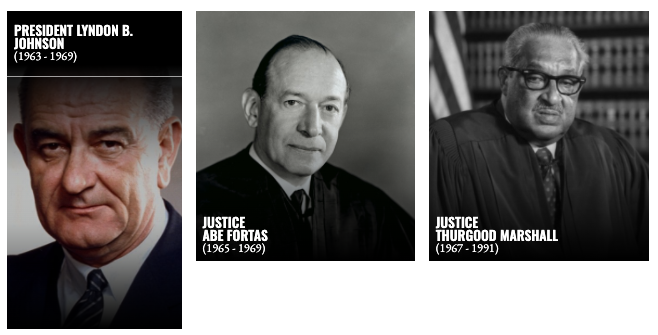The Volokh Conspiracy
Mostly law professors | Sometimes contrarian | Often libertarian | Always independent
Today in Supreme Court History: August 26, 1964
8/26/1964: Lyndon B. Johnson nominated as Democratic candidate for president. He would make two appointments to the Supreme Court: Justices Abe Fortas and Thurgood Marshall.

Editor's Note: We invite comments and request that they be civil and on-topic. We do not moderate or assume any responsibility for comments, which are owned by the readers who post them. Comments do not represent the views of Reason.com or Reason Foundation. We reserve the right to delete any comment for any reason at any time. Comments may only be edited within 5 minutes of posting. Report abuses.
Please to post comments


Should have gotten to name a Chief Justice also, but fell victim to a refusal to hold hearings by the then-Southern Democrats (nowadays they're called "Republicans").
But if that's true, the dolorous martyrdom of Merrick Garland would not have been unprecedented, which was a key talking point.
But the narrative need not worry, there actually were hearings, according to this entry from Worldcat:
Nominations of Abe Fortas and Homer Thornberry : hearings before the Committee on the Judiciary, United States Senate, Ninetieth Congress, second session, on the nomination of Abe Fortas, of Tennessee, to be Chief Justice of the United States, and nomination of Homer Thornberry, of Texas, to be Associate Justice of the Supreme Court of the United States.
Author: United States. Congress. Senate. Committee on the Judiciary,; United States. Congress Senate.
Publisher: Washington, D.C. : United States Government Printing Office, 1968.
Edition/Format: Print book : National government publication : English
Fortas's nomination was filibustered by Southern segregationists. (Mind you that both Johnson and Fortas were Southerners.) They ran out the clock and, though Earl Warren had timed his resignation to avoid this result, Nixon got to pick his successor.
Johnson wanted to promote Fortas from Associate Justice to Chief Justice (Fortas later resigned because of his links to some dubious character).
As Chief Justice, Fortas wouldn't have had any extra votes or necessarily any more power over his colleagues (I mean, look at Burger).
The key figure in this scenario if Homer Thornberry, whom Johnson wanted to replace Fortas as Associate Justice.
Wikipedia was highly informative. He surmounted his parents' deafness, so yay for that. He got elected to the House of Representatives as a Democrat - in the district LBJ had represented before he went to the Senate.
Thornberry refused to sign the Southern Manifesto, but that doesn't mean he was a rabid civil-rights guy. "Thornberry voted against the Civil Rights Act of 1957 but in favor of the Civil Rights Act of 1960 and the 24th Amendment to the U.S. Constitution."
If Nixon had nominated him, it would have been seen as part of the Southern Strategy.
Still, I suppose we must all bemoan his failure to get on the Supreme Court.